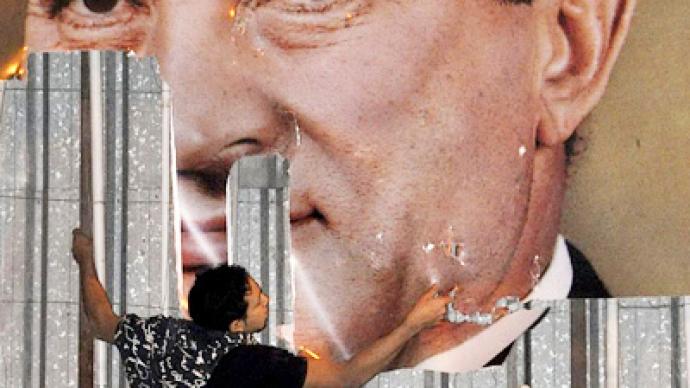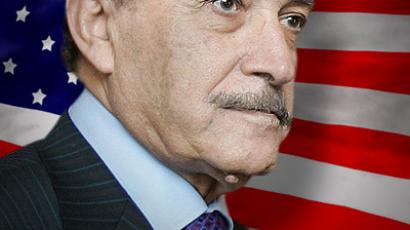Hosni Mubarak half-resigns and stays

On Thursday night, Egypt’s President Hosni Mubarak addressed the nation in response to the recent continuous protests against his regime.
Two weeks of protests in Egypt were smashed by President Mubarak’s televised national address. Mubarak went on air several hours later than expected, raising the tension among the protesters, but his fifteen minute speech revealed few sensations and did not meet the demonstrators’ expectations. Mubarak vowed to remain in office until September, not wishing to bow to 'foreign pressure'. He said he would not run for a new term, but would ensure the reform process and peaceful transition of power until the upcoming presidential elections in September. Mubarak acknowledged that the demands of the protesters were just and legitimate. However, he chose to meet their demands by stepping back, rather than down.
Omar Suleiman, 90 per cent president of Egypt
Egypt’s constitution allows the president to transfer his powers if he is unable to carry out his duties "due to any temporary obstacle," according to the Associated Press. The president does not necessarily have to resign in this case. Mubarak played this card and delegated his power to Omar Suleiman, Egypt’s Vice President. Mubarak retained his title of president, but provided Suleiman with official authorities to continue the regime’s efforts to settle the crisis. The question people ask now is which of the two will be the actual mastermind until the September elections and what authority, exactly, was handed over to Suleiman.Suleiman also addressed the Egyptians after Mubarak finished his speech. He called for the end of the protests, urging demonstrators not to fall under the influence of foreign mass media."Youth of Egypt, heroes of Egypt, go back to your homes and businesses. The country needs you so that we build, develop and create," Suleiman said, as quoted by AP.
Egypt on the brink of social explosion
Mubarak’s address was not well-received by hundreds of thousands gathered across the nation. Protesters gathered in Tahrir Square in Cairo began shouting “Leave! Leave! Leave!” half way through Mubarak’s speech.When he finished, protesters were outraged and bitterly disappointed. ITAR-TASS news agency reports boots thrown in the air – a sign of utmost contempt in the Arab world.Also, the opposition leader, Mohammad ElBaradei, warned the Egyptian government against the social explosion Mubarak’s address could trigger and called for the military to become involved.But the military has not reacted so far. Still, the AP reported that before Mubarak’s address was aired, the top general for the Cairo area told protesters in the square that all their demands would be satisfied. Later, the disappointed crowd started making its way from Tahrir Square to the premises of the state television company which aired the president’s address. Protests are not expected to subdue.
After being an all-powerful autocrat for over 30 years, Hosni Mubarak is neither psychologically nor mentally ready to resign, and the Egyptian president and the people around him are shocked that the protests are continuing, according to Richard Howitt, member of the European Parliament.“I’m very clear that the Egyptian people will not accept what Mubarak thinks,” he added.A candidate to head Egypt's interim government is Vice-President Omar Suleiman, who is close to the country’s military and intelligence, but his recent statements about the Egyptian people not being ready for democracy and that there exists the, quote, “love” for Mubarak. Such statements are unacceptable for protestors on Tahrir Square and now it looks impossible that he could be the head of transitional government. “He is absolutely tainted by the Mubarak regime,” Howitt says.
Destination unknown
The worldwide community was somewhat taken aback by this sudden turn, as even the CIA predicted that Mubarak would resign.French President Nicolas Sarkozy, commenting on Mubarak’s address, said it was "inevitable" for Mubarak to step down at some point, but warned Egypt against falling into "religious dictatorship”, reports AP.Britain's foreign secretary William Hague said, according to the AP, that the consequences of the address remained unclear and again urged Egypt for a quick transition to a more representative government.
“The only substantial changes he [Mubarak] promised would be the appointment of two committees and reaffirmation of his decision to retire after the election. There is nothing new,” says Richard Brenneman, a journalist and author. Brenneman believes the military will play their role in the unfolding events in Egypt. They are a big player and “clearly do what they want”, Brenneman says. Brenneman is also concerned by Mubarak voicing, in his address, the promises for “utmost punishment and penalty against people who were responsible” for the recent uprising and implementing whatever changes by using the armed forces.
Michael Hughes, a journalist for The Huffington Post and analyst for the New World Strategies Coalition, agrees that the military’s allegiance is the key to Egypt’s future. “The military can dictate everything,” he says. But Hughes does not believe the army would betray Suleiman, an ex-head of the intelligence service and a former general. The US is not happy about Egypt’s new democracy, they need somebody like Mubarak, Hughes thinks. However, as events should unfold, Egypt will become less influenced by Washington. “The US will have to take a new approach with whatever regime comes to power, unless it is Omar Suleiman, then its new puppet is same as the old,“ he says.
Ramzy Baroud, the editor of PalestineChronicle.com, is disappointed at Mubarak overcomplicating things as he faces what looks like the inevitable. Baroud plays down Thursday night’s address, saying that “Hosni Mubarak is trying to give the Egyptian revolution this Hollywood-style ending. It really didn’t have to have this kind of final showdown between the Egyptian people and their very, very stubborn president, but he insists on turning it that way.”“All eyes and ears are right now on the army to determine the next step,” Baroud points out, echoing most experts’ speculations.














